Your desk—just like every other piece of furniture you choose for your home or office—needs to be functional, sturdy, and comfortable. Ideally, it’s got to look good, too.
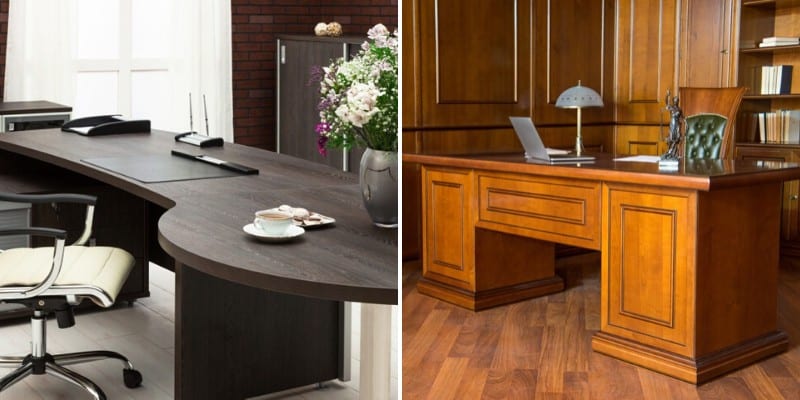
- Functionality: is it easy to reach the items you’ll use on a regular basis? Do you have enough desk space to work effectively? Does the storage make sense to the way you work?
- Sturdiness: as with anything we buy, you want your desk to last. Is it made from high-quality materials that will withstand daily use? Is it a new product, or are you buying second-hand.
- Comfort: if you’re actually going to spend time at your desk, it’s going to have to be comfortable. Is it adjustable, or does it sit at the proper level for your height? If you have to slouch to work at your desk, it is not going to be a sensible investment for you long-term.
- Good looks: in an office space, your furniture is part of your brand. If professionalism is important to you, choosing sleek, aesthetically-pleasing furniture is important. For your home, you may just want a workspace that can serve a bunch of different functions and not care about how the desk looks. Alternatively, you may want something that ties in with a very specific design aesthetic you’ve been working with.
There are many different types of desks—16 that we’re going to be exploring here. 4 of those types are the specific material types a desk can be made of. Of course, there are other materials that can be used in building desks. Today we’re identifying the 4 most popular.
Let’s start with desk material:
Glass Top Desk
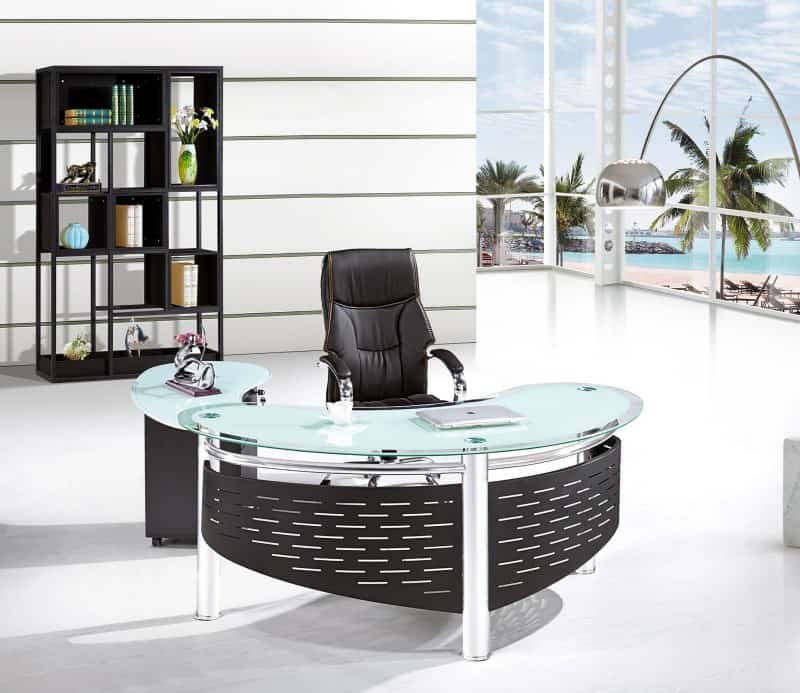
Glass desktops are a bold, modern, sleep look for any office or home. Glass desktops are often paired with a metal or wooden frame, giving a nice contrast and helping your office area to look more open and light.
A glass top desk can make an excellent workspace when you don’t need to store a lot of items away. More popular for furniture like boardroom tables or reception area desks, they are more aesthetically pleasing than they are functional.
A glass top desk will require regular cleaning and be more susceptible to greasy fingerprints, smudges, and scuffs than some other desk materials. You’ll also need to be more careful if you have to move it to a new home or office.
Finally, if your glass top desk is a unique shape—like a corner unit or crescent shape—it can be very hard to find a replacement at a reasonable price.
Best for: Reception and foyer areas, boardrooms, or conference facilities.
Wooden Desk
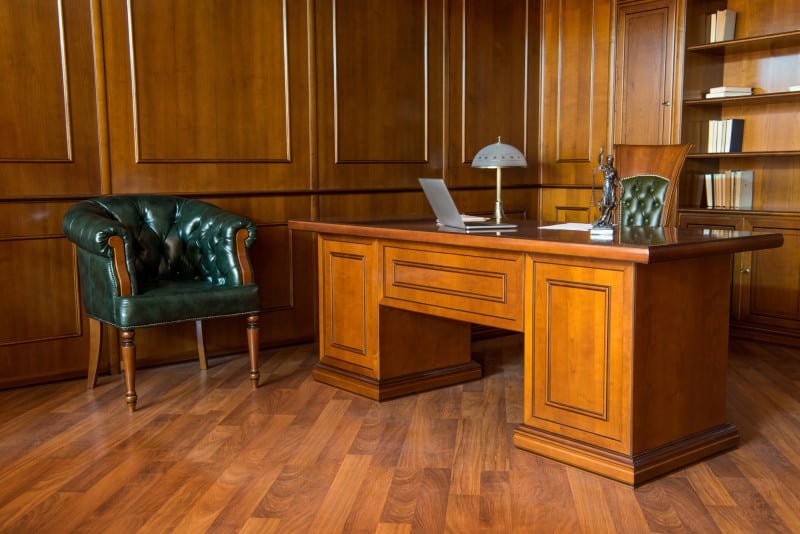
Wooden desks are the most traditional, and offer a classic, timeless, elegant look to any office. They are also extremely hard wearing. The main options when it comes to wooden desks are solid wood or plywood.
Solid wood
This is the classic manufacturing process—a tree is cut down, cut to specific board lengths, and assembled to create your desk.
As we become more aware of the impact our lives have on our environment, many of us have also become more aware of waste.
With solid wood furniture manufacturing, the yield produced is often less than the materials wasted. New solid wood furniture can contribute to waste, unless it is sustainably sourced.
Purchasing recycled or second-hand wood furniture drastically cuts down on environmental impact, for the savvy desk buyer.
Although solid wood desks are not resilient to scuffing or scratching, these can tend to lend to the charm and character of wooden furniture.
Best for: a classic, elegant look for any office or home.
Plywood
Plywood is manufactured specifically to create panelling, which is then used to create furniture. Ply has the look of wood—and often uses a natural wood finish—while also offering less chance of swelling, warping, and shrinking.
Plywood is also better for the environment as it creates less waste and doesn’t contribute to deforestation in the way that new solid wood furniture can.
Best for: a versatile, hard-wearing desk that is lighter and more affordable than solid wood.
Metal Desk
Metal desks offer the ultimate in minimalism and utilitarian aesthetic. They are made of sheet steel—metal sheeting that is then cut and shaped to form shelves, desks, desktops, or storage furniture.
The cost and quality of a metal desk are going to depend on the workmanship and the gauge of sheet metal used. A higher gauge means a thicker sheet of metal, which effectively costs more and lasts longer.
Metal desks are extremely resilient, and stand up to scuffing, warping, and damage. Being metal, they also offer natural water and heat resistance.
Metal desks can easily last 10-15 years if cared for properly, and many come with warranties that cover normal use over up to 10 years.
Best for: those wanting a utilitarian desk that is long-lasting—and who have the disposable income to justify the high cost.
Laminate Desk
Laminate desks are a popular choice that overlays a laminate over a ply or particle board construction. The laminate protects the board from basic spills and stains, but not so much from any kind of impact damage.
Laminate desks are lightweight, easy to move, can be assembled easily at home, and are extremely affordable.
Unfortunately, they have a very short lifespan, and may not be a good choice for holding heavy, valuable computer or electronic equipment.
Best for: a cheap and easy option for students or children.
Let’s now see various other types of desks based on functionality, features etc.
Computer Desk
Computer desks offer space for your computer monitor—often in a dedicated monitor compartment. They also offer enough desk real estate for a large keyboard, mousepad, peripheral accessories, and component storage.
Computer desks traditionally needed to be sturdy and resilient, because they held a lot of valuable electronics.
Now, however, more people have made the move to working from laptops and tablets, meaning there is little need for cable and accessory storage.
As more people make the switch to portable and mobile devices, the need for a specific computer desk—which can be expensive and bulky—has dropped considerably.
Best for: people still using a desktop P.C. or those who need this kind of build for gaming or design work.
Writing Desk
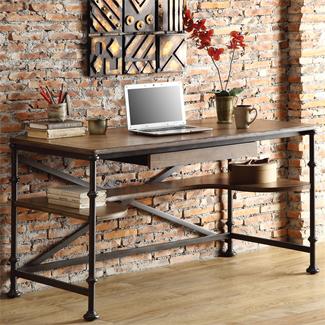
When you think of a desk, this is probably what you think of. Simple, minimalistic, rectangular shaped desks with a few storage drawers and a large, flat desktop.
This is the most common design for a home office desk, as it takes up minimal space. It is useful for working from a laptop or mobile device, offers a minimal amount of storage space for stationery, and is simple enough not to interfere with your interior décor.
Best for: anyone who needs a simple, basic home office solution.
Office Executive Desk
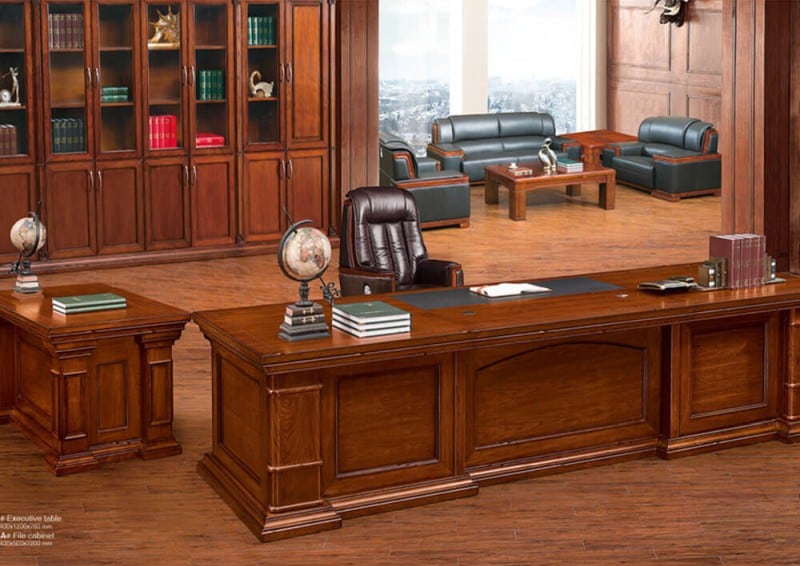
The executive desk is large, often made of solid wood, and offers a large desktop area and plenty of storage space.
These desks are designed to lend a classic, grand feel to an office space. The executive desk can be configured in multiple ways—as a rectangle desk, L-shaped corner unit, or U-shaped unit—but the rectangular option is by far the most well-known.
Best for: businesses and homeowners who enjoy classic, timeless elegance and have the available space for an extra-large, heavy wood desk.
Floating Desk
A floating desk is mounted to a wall of your home or office, completely freeing up your floor space. Many floating desks take advantage of shelving and small cubby storage, and are a great way to minimize the amount of space your workstation takes up.
Best for: small apartments, dorms, or bedrooms—provided you own the property or have permission to wall-mount a desk unit.
Corner Desk
Corner desks are a convenient way to solve a space issue, make use of the only available space in a room, or provide more desktop real estate.
A large L-shaped unit can offer almost twice the workspace of a writing desk, and a small L-shaped unit can fit snugly into a corner that can’t be used for anything else.
Best for: those who need more leg room than a standard writing desk allows—or for multi-monitor or ultra-wide screen computer setups.
Credenza desk
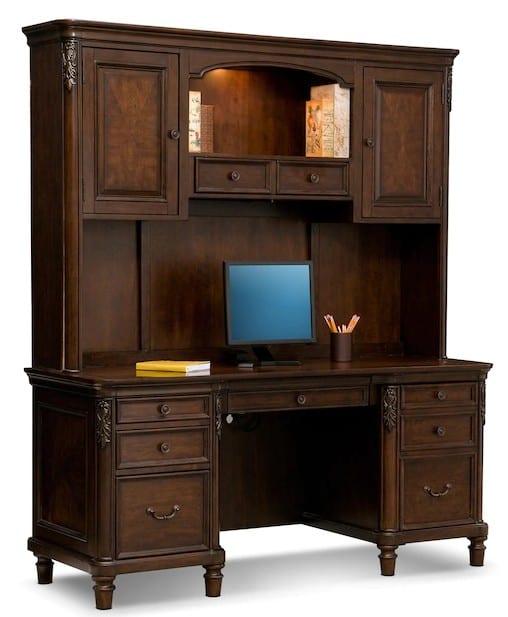
A credenza is a multipurpose workspace solution. It combines a simple writing desk space with a full storage solution. Usually installed in a large area—like a dining or living room—it looks elegant, allows you to use one space in multiple ways, and makes your desk area look less utilitarian and more homely.
Best for: disguising a living room workspace, as the shelves can be used for books, ornaments, photos, or additional storage.
Roll-top desk
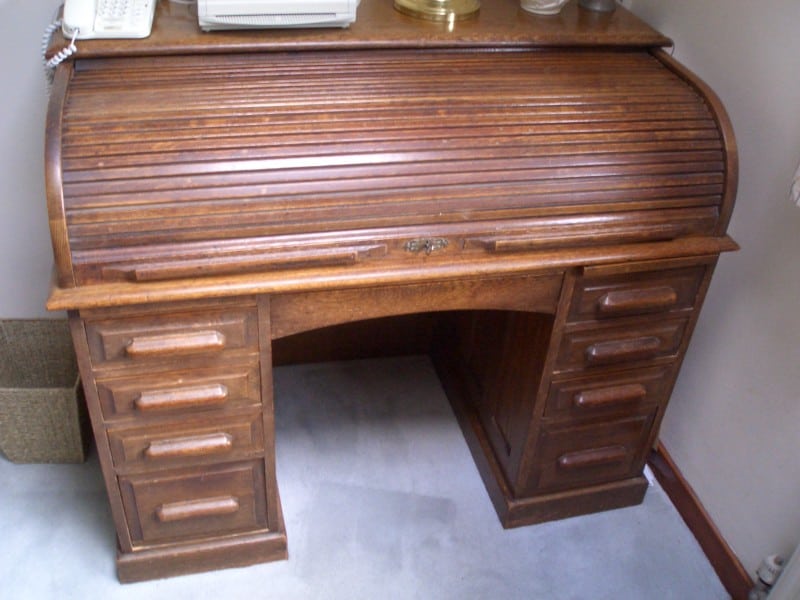
Most people who think of roll-top desks picture the antique version, but modern versions exist as well. A roll-top desk has a hood that rolls down over the desk surface to cover it up and secure your workspace.
Some offer drawers on both sides, one side, or no drawers at all. Whilst it’s not the most practical workspace solution, an antique roll-top desk lends an air of class and history to your office or home.
Best for: people who like the appeal of antiques, and don’t really need to do a lot of work from their desk.
Adjustable Height Desk
Also known as a standing desk, this option is increasing in popularity as studies reveal how bad our sedentary lives are for us. Standing at our desks is said to have health benefits when compared to the default sit-down option.
The options for adjustable height desks are numerous, although the most advanced offerings allow users to raise and lower the worktop to a height that suits them.
Best for: those wanting to take advantage of the health benefits of a standing desk.
Dual-sided desk
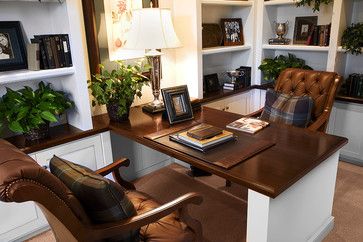
Often referred to as a partners’ desk, this is an antique desk for that looks similar to an office executive desk—but twice as deep.
It is effectively two office executive desks manufactured as one face-to-face unit. It was initially designed for business partners to work together at the same workspace, back before we were all joined by multiple phone lines, the internet, and group video chats.
It was particularly popular with bankers in the 19th century. There have been many reproductions of the dual-sided desk, but the most beautiful are the antique versions, with tooled leather inlays, brass fittings, and high quality oak, walnut, and mahogany finishes.
Best for: the ultimate in office decadence, where an office executive desk just isn’t enough.
Bench System Desk
The bench system desk is a componentry system that allows users to connect multiple freestanding desks together. Most common in open-plan office spaces, collaborative work settings, and coworking spaces, bench system desks have a modern look, useful customization options, and allow for a clutter-free space.
Usually, a bench system desk will be manufactured from steel and high-quality plastic materials for durability and style. They allow for central cables to be run between the components, can integrate screen dividers, and can be positioned in any number of ways to create a fully functional space.
Best for: coworking spaces and open offices.
Armoire Desk
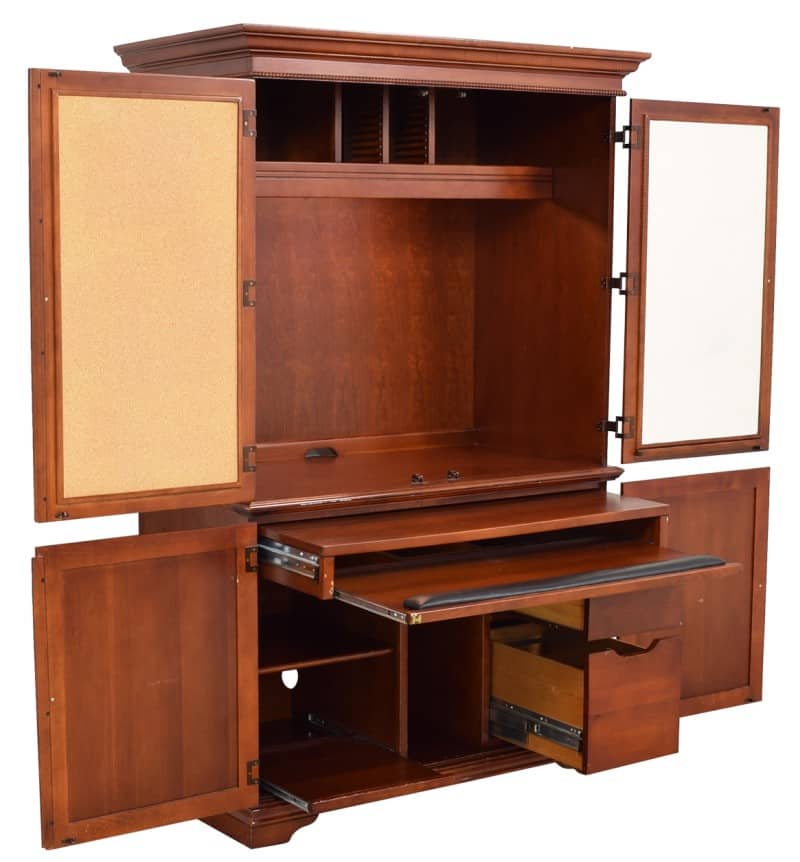
An armoire desk combines a writing desk with a large cupboard-like build. The doors can generally be closed to contain the entire workspace, making it an ideal solution for communal areas of the home, or people who tend to create clutter while they work.
The components inside the armoire desk unit can vary from multiple floating shelves above the desk itself, to bookshelves, drawers, and various types of storage.
Another benefit to the armoire desk is the ability to use the inside of the closing doors as space for keeping notes, calendars, and correspondence pinned.
Best for: small communal spaces where you may not want your work on display.
Secretary Desk
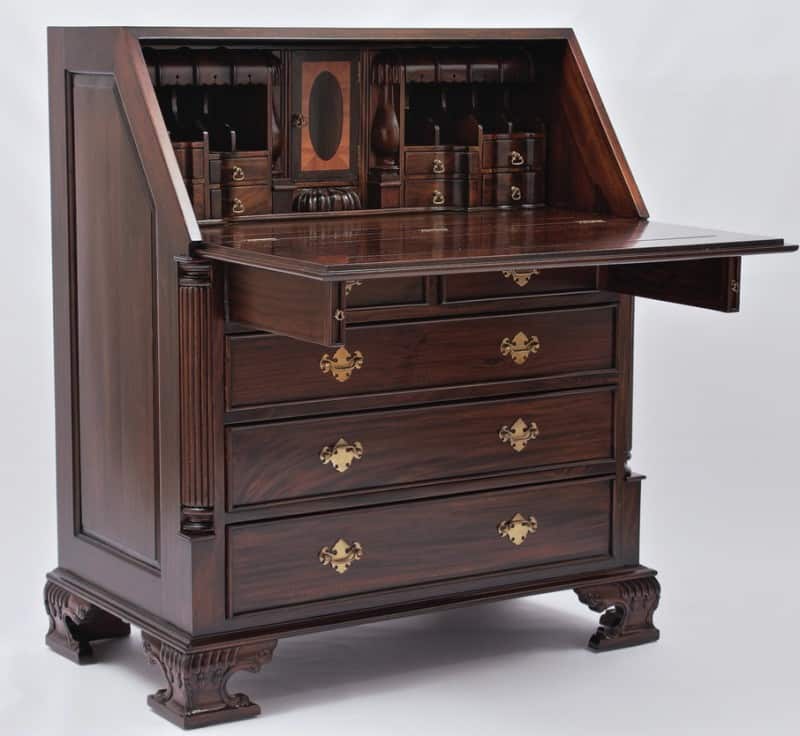
This is another type of ‘closable’ workspace. The desk has a hinged surface which folds out into a flat desk surface. When closed, the unit looks like a sideboard, with drawers or cuboards for storage.
Classic secretary desks are elegant and ornate, and were designed for homes that didn’t have the space for a roll-top desk.
Best for: antique collectors. The secretary desk offers very little practical value for today’s working professionals.
Related Posts
- How to Protect Sliding Glass Doors from Burglars: Essential Security Tips
- How Long Do Sliding Glass Doors Last? Durability and Lifespan Explained
- Here Are Some Pros and Cons of Textured Walls in Homes
- Why Do Sliding Doors Get Stuck? Common Causes and Solutions
- Comparison of Knockdown Drywall Texture vs Orange Peel
- Some FAQ (Frequently Asked Questions) About Wall Paneling for Homes
Leave a Reply